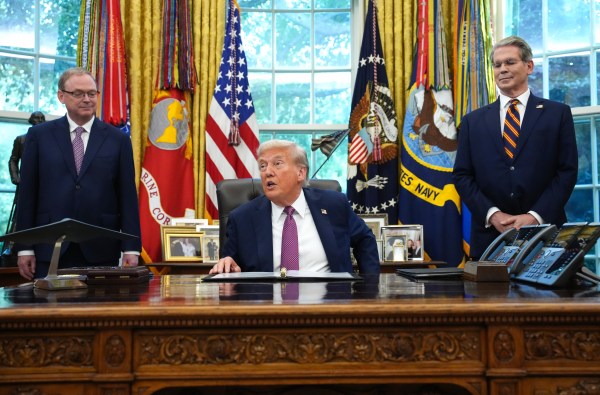The war in Ukraine will be won by whichever side maintains its supply lines the longest.
Ukrainian forces have wrecked the Russian military by disrupting its ability to resupply its troops. Early on, that meant targeting Russian trucks with shoulder-fired missiles; lately it has meant precision long-range HIMARS strikes on railways and bridges. As a result, Russia’s ability to keep its men fed, fueled, and fighting has been so badly degraded that it was forced to take the unthinkable step of abandoning Kherson last month.
Kherson had been occupied since the first days of the war. Its proximity to Crimea made it easy in theory to keep the necessities of combat flowing to occupation forces there. Moscow even formally “annexed” Kherson oblast in late September, committing the Russian military to its eternal defense.
Six weeks later, fearing that all means of resupplying front-line troops would soon be extinguished, the Russian command pulled out. It was Ukraine’s greatest victory of the conflict, a gross humiliation for Putin given that he had declared the area part of Russia proper. And it placed Ukrainian artillery closer to Russian supply lines in parts of the country that have been occupied by Moscow for years, threatening to turn a war of conquest into a net loss of territory for the occupiers.
You’ve heard about the Russian retreat from Kherson, I assume. But did you notice the date on which it was announced?
November 9 was one day after Americans went to the polls. If you believe Russian state media, the timing wasn’t coincidental. “[The withdrawal] was announced after Nov. 8, on Nov. 9, so it wouldn’t influence the U.S. elections,” Russian TV’s most famous propagandist, Vladimir Solovyov, speculated at the time. Another host weighing the midterm result wondered what it might mean for “our guys in America,” prompting another guest to clarify: “Our Republicans.”
Moscow knows that America’s two parties differ in their enthusiasm over Ukrainian victory. Ukraine knows it too.
The midterms didn’t go well for “our Republicans” but they went just well enough to hand control of the House to the GOP. The party of Donald Trump, Marjorie Taylor Greene, and populist authoritarian simps various and sundry now enjoys a veto over future outlays of U.S. military and economic aid to Ukraine. After months of watching Ukrainian troops systematically cut their side’s supply lines, Russia now has a means to cut Ukraine’s without firing a shot.
And so, for the first time since the start of the war, Volodymyr Zelensky is making a diplomatic trip abroad.
When I wrote in September about the prospect of a Republican civil war over Ukraine aid, I ended with advice for GOP hawks. “If I were Mitch McConnell or Mitt Romney or some other Republican who’s invested ideologically in Ukraine’s success,” I said, “I’d find a reason to visit Zelensky sometime this fall and take partial credit for their military’s success. The more Americans—Republican voters, specifically—feel that this is their victory too, the less likely they’ll be to pull the plug [on aid] before Ukraine has finished the invaders off.”
It was good advice. It just didn’t occur to me that Zelenksy might be willing and able to visit McConnell and Romney in Washington. But desperate times call for desperate measures.
Had Democrats retained the House, aid to Kyiv would have continued to flow indefinitely. Had the red wave arrived and Republicans won handily, Kevin McCarthy might have had enough of a majority to allow him to ignore the anti-anti-Putin MAGA goblins in his caucus. In either case, I suspect, Zelensky wouldn’t have felt obliged to take the risk of traveling to America today. He would have Zoomed in, assuming he addressed Congress at all.
But the outcome of this fall’s House races was a worst-case scenario for the Ukrainians. Democrats are out of power and the incoming Republican speaker will be saddled with a narrow majority, giving the populist bloc outsized leverage over policy. It’s anyone’s guess as I write this on Wednesday morning whether Kevin McCarthy will allow himself a photo today with the Ukrainian president, knowing how it might antagonize some Republican members whose votes he’s trying to win. I’d bet yes—but I wouldn’t bet heavily.
“Put America first” is Greene’s way of complaining that less than 3 percent of a $1.7 trillion spending bill will be used to continue to decimate a longtime U.S. enemy and regional fascist menace. Rarely have federal outlays ever achieved so much bang for the buck. Yet, curiously, those outlays remain a special irritant to post-liberals.
Virtually any other politician in the free world would relish the public goodwill that comes with being seen with a globally recognized symbol of freedom and democracy like Zelensky. As it is, it’s not implausible that the sight of McCarthy joining a standing ovation during the Ukrainian’s address to Congress this evening will harden populist resolve against him and destroy what remains of his chances of becoming speaker.
Imagine being so perverted morally that you’re, at best, agnostic on whether to support this country …
… against this one.
That’s what McCarthy’s dealing with on the far right of his caucus. And while I’d like to believe that even a reptile like him will do the right thing on Ukraine aid eventually, there’s enough doubt that Zelensky felt compelled to put his own life in jeopardy to lobby him in person. If McCarthy is destined to pull the plug on Ukrainian sovereignty because his weak grip on power requires him to kowtow to the strongmen fanboys of the vaudeville circuit, Zelensky’s at least going to make McCarthy look him in the eye before he does it.
In Tom Nichols’ words, we’re about to learn “whether anything Zelensky can say will matter to a Republican Party that has decided to torment the ghost of Ronald Reagan by taking sides with a neo-imperial Soviet nostalgist.”
He’s also coming to plead his case to American voters, of course, recognizing that Ukraine fatigue is real. A direct appeal just before Christmas might firm up flagging support on the right, the surest way to strengthen the hand of Republican hawks against the Gaetz/Greene “defund” faction.
Yesterday Mitch McConnell called aid to Ukraine “the number one [defense] priority for the United States right now, according to most Republicans.” That may have been true once but I’m not sure it is anymore. Support for Zelensky’s forces was high and bipartisan during the first months of the conflict but GOP enthusiasm has started to drift since the summer. A Gallup poll in August found 43 percent of Republicans thought the U.S. had done “too much” to help Ukraine. Last month a Wall Street Journal poll saw that number rise to 48 percent, with just 35 percent of the party favoring additional aid.
A more recent poll found Republican support for sending additional weapons back up to 55 percent, possibly buoyed by the success in Kherson, but that was more than 20 points lower than Democrats and nearly 10 points lower than independents. Support for providing more economic assistance slipped to 50 percent among GOPers, meanwhile, threatening to become a minority position even at a moment of major progress for Zelensky’s forces.
All of that is very important. Because, realistically, U.S. support for the war collapsing is Putin’s only hope of victory.
His army hasn’t advanced meaningfully in months. Many of Russia’s most seasoned troops are dead now, replaced at the front by conscripts with little training and antiquated equipment. A superb new New York Times analysis of Russia’s endless war blunders began with the story of laborers who were recently drafted, handed some old Kalashnikovs, and sent directly into the Donbas without maps, medical kits, walkie-talkies, or even much food. They were quickly ripped apart by Ukrainian shelling, reduced to “hamburger” in the words of one maimed survivor. That’s all that’s left of Russian strategy for the moment, it seems—throwing bodies at the Ukrainians to slow them down while waiting patiently for partisan politics to cannibalize Western, and particularly American, resolve.
How long is Putin prepared to wait? Longer than you might think. From the Times:
People who know Mr. Putin say he is ready to sacrifice untold lives and treasure for as long as it takes, and in a rare face-to-face meeting with the Americans last month the Russians wanted to deliver a stark message to President Biden: No matter how many Russian soldiers are killed or wounded on the battlefield, Russia will not give up.
One NATO member is warning allies that Mr. Putin is ready to accept the deaths or injuries of as many as 300,000 Russian troops — roughly three times his estimated losses so far.
Perhaps the Russian army will break in the field, but it hasn’t yet despite tremendous losses. Perhaps the Russian people will rise up and depose the czar, but a culture weaned on militarism and mortal sacrifice may be more patient than we assume. Putin is reportedly being shrewd (and characteristically ruthless) in his selection of future conscripts so as not to antagonize the power brokers who might plausibly make trouble for him. It’s better to die in battle for Russia than to drink oneself to death, he said recently, a hint that he plans to have the country’s poor and dispossessed do most of the fighting.
And as for those who are sent to the front and refuse to fight, not wanting to be turned into “hamburger,” the alternative may be worse. Allegedly some Russian troops have been tasked with forming a second line behind the cannon fodder who are sent to the front; anyone who turns tail and runs away from the Ukrainian fire before them faces Russian fire behind them.
Simply, Putin is wagering that his people will be more willing to tolerate extreme privation—at gunpoint, if need be—in the name of victory than Westerners will be willing to tolerate mild privation to keep the Ukrainians supplied, especially if the Russians regain some momentum. Putin visited Belarus this week to meet with his puppet, Alexander Lukashenko, a possible prelude to Russia attempting a new advance on Kyiv from the north. The point wouldn’t be to seize the capital, which is unlikely. It would be to stop the Ukrainian advance in the south by forcing them to divert north and to give Putin’s useful idiots in the West a reason to claim that the tide has turned such that further aid is pointless.
Zelensky is in Washington today to try to head that message off at the pass before it gets traction among Americans. And he’s willing to do it in public, at some risk to himself, quite in contrast to the evil gnome behind the 800-foot-long table in Moscow.
But there’s one more audience whom he’s hoping to reach.
Although the two speak regularly, Zelensky is planning to make the case to Joe Biden in person that the next round of U.S. weapons shipments, while welcome, isn’t enough.
That’s a sore spot between them. Reportedly Biden lost his temper with Zelensky during a phone call this past summer when he told the Ukrainian that another $1 billion in aid had been approved and Zelensky replied by listing all of the aid that hadn’t been provided. “The American people were being quite generous, and his administration and the U.S. military were working hard to help Ukraine,” Biden allegedly said, raising his voice and stressing that “Zelensky could show a little more gratitude.”
I presume Zelensky won’t make that same mistake tonight in his address to Congress. A speech aimed at American voters should be long on gratitude, and ideally will describe in meticulous detail how U.S. aid has averted wider catastrophe in Ukraine. The more the public believes that its money is being put to good humanitarian use, the harder it’ll be for the goblin wing of the House GOP caucus to convince them that helping the Ukrainians is wasteful.
In Zelensky’s defense, his ingratitude may stem from the fact that he seems to imagine Ukraine’s fight as part of the liberal West’s (specifically, Europe’s) age-old confrontation with authoritarian Russia—and rightly so. If Ukrainians are defending the liberal Western order, they shouldn’t need to beg for aid from Western allies. They expect it because it advances our common cause. Giving them weapons is a “favor” in the same way that a government supplying rifles to its own troops is a “favor.”
But as we’ve learned the hard way over the last six years, not all Americans see the liberal Western order as worth supporting. Those who don’t will never see Ukraine’s cause as “our” cause. But those who are on the fence, whether for ideological reasons or due to sticker shock, might be convinced to keep the aid flowing if Zelensky lavishes praise on them for all the good their generosity is doing.
That’ll be the face he presents to the public, I expect. The face he presents to Biden behind closed doors may be different.
Kyiv has appealed directly to the Biden administration for more advanced weapons — weapons that they say could potentially lead the way to victory. But the U.S. is hesitating, frustrating Ukrainian officials at a time when they are trying to advance on the battlefield and continue to push back Russian forces.
…
“He needs longer-range weapons to enable him to preempt an expected Russian offensive,” said Bill Taylor, the former U.S. ambassador to Ukraine. “He needs immediate financial support to keep his government running, and he knows that Congress will make decisions on these items this week.”
…
“For us the strategy is to continue attacking because we cannot afford to freeze the frontline. We need to constantly press,” said Oleksandr Danylyuk, Ukraine’s former national security adviser, who has continued to advise on military planning. “We have reached the limit of what we can do with the advanced weapons the U.S. has already provided. For the next stage, we need the longer-range weapons to achieve [our] goals.”
The White House is willing to give Ukraine advanced defensive weapons, like Patriot missiles, to stop Russian jets from further degrading Ukrainian energy infrastructure. But they’re leery of providing offensive long-range weapons like ATACMS missiles or sophisticated drones, fearing that Ukraine will use them to strike deep inside Russia and provoke Putin into widening the war. The Ukrainians have already flown domestically developed drones hundreds of miles into Russia to hit military bases there, sending fascist vatniks into a retaliatory frenzy. More attacks on the Russian homeland may lead the strongman Putin to do something rash to demonstrate his strength.
Biden is right to worry about it. But Danylyuk’s point is inescapable: Ukraine is on the clock as Republican patience with the war runs down. Each time the Ukrainians stop advancing, the anti-anti-Russian case that we’re throwing money down a sinkhole by supporting Kyiv gets stronger. If the point is to win, there may be no alternative to giving Ukraine whatever weapons it needs to try to retake all of the Donbas, if not also Crimea, sooner rather than later.
And if the point isn’t to win, why are we funding Ukraine at all?
I suppose one could say that it doesn’t matter to the United States who “wins” so long as Russian power is severely degraded, in which case the mission has already been accomplished. “We’ll support you just long enough for you to lose” may not be the optimal signal to send to other U.S. allies like Taiwan, though. And to the extent American aid to Ukraine is designed to avert human suffering, a prolonged war that ends with Russia occupying the country anyway feels like a nightmare scenario. The only thing worse than an orc, after all, is an orc that’s wounded, angry, and out for retribution.
Having watched Kabul fall with horrifying speed to an army of brutal primitives last year, I doubt Democrats will allow the same thing to happen to another foreign capital on Biden’s watch. They’ll keep the money coming. But the other party gets a say now too. How long they’re willing to keep signing checks may depend on tonight.
As I was finishing this column this afternoon, news flashed across my screen.
That’s encouraging, but the Times is already speculating over how many House Republicans will and won’t show for this evening’s address. The answer will set the tone for the incoming majority. If I were McCarthy, I’d want every last one of my supporters for the speakership to be there to show the Never Kevin populists who has the numbers within the caucus and who doesn’t. The sooner the post-liberals learn that they won’t get to call the tune next year, the easier McCarthy’s job will be.







Please note that we at The Dispatch hold ourselves, our work, and our commenters to a higher standard than other places on the internet. We welcome comments that foster genuine debate or discussion—including comments critical of us or our work—but responses that include ad hominem attacks on fellow Dispatch members or are intended to stoke fear and anger may be moderated.
With your membership, you only have the ability to comment on The Morning Dispatch articles. Consider upgrading to join the conversation everywhere.